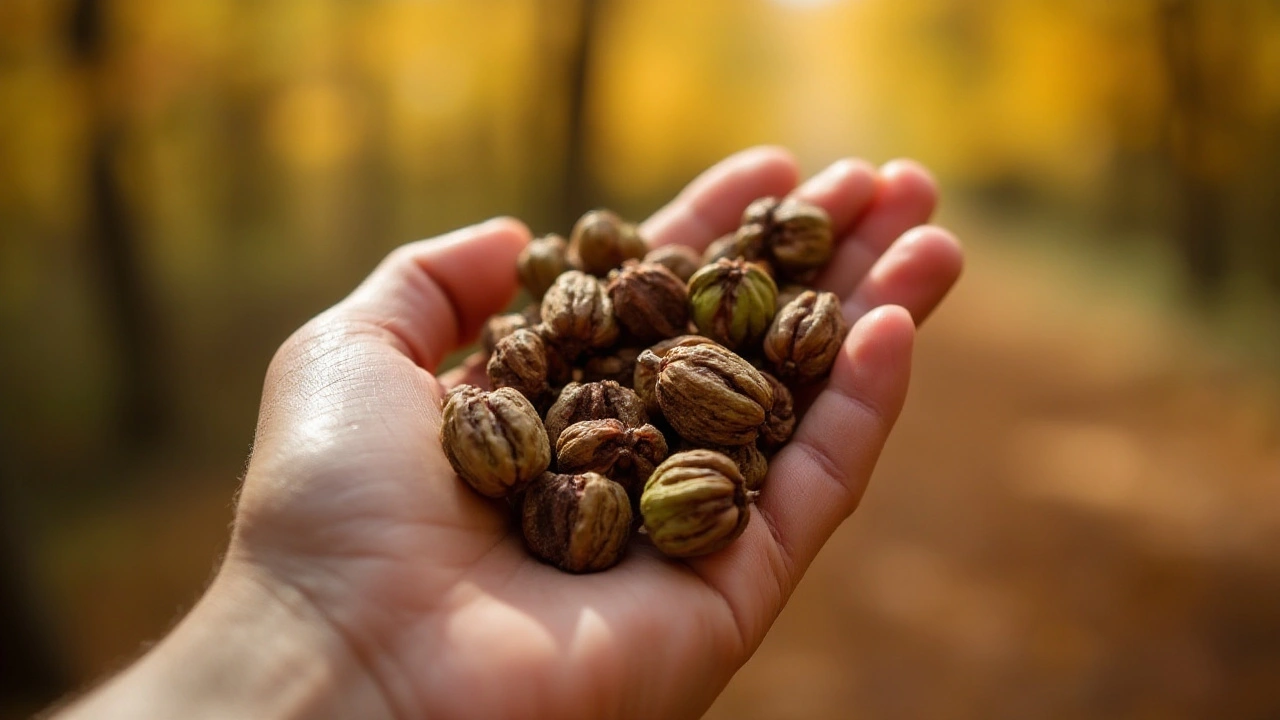Have you ever heard of Black Walnut? This amazing tree nut has been used for centuries for its medicinal properties and nutritional value. Whether you’re looking to boost your immune system, improve your digestive health, or simply add a nutritious supplement to your diet, Black Walnut might just be the answer.
With its rich nutrient profile and a history steeped in traditional medicine, this small yet mighty nut offers numerous health benefits. Let’s dive into the fascinating world of Black Walnut and discover why it should become a staple in your daily health regimen.
- Nutritional Powerhouse
- Traditional Uses
- Health Benefits
- How to Incorporate Black Walnut
- Precautions and Recommendations
Nutritional Powerhouse
When we talk about superfoods, Black Walnut often gets overlooked. But did you know that this unassuming nut is a nutritional powerhouse? Rich in vitamins, minerals, and antioxidants, Black Walnut offers a wealth of health benefits that can help improve your well-being.
The most impressive aspect of Black Walnut is its incredible nutrient density. It contains high levels of essential vitamins such as vitamin C, vitamin E, and several B vitamins. These vitamins are crucial for various bodily functions, including immune support, energy production, and maintaining skin and eye health. The vitamin C content, in particular, helps in combating oxidative stress, which can lead to chronic diseases.
Minerals are another area where Black Walnut excels. This nut is a great source of magnesium, potassium, and calcium, all of which are essential for bone health, muscle function, and cardiovascular health. According to the USDA, a 100-gram serving of Black Walnut contains about 158 mg of calcium and 380 mg of potassium. These nutrients work together to maintain a healthy and robust body.
Black Walnut also contains omega-3 fatty acids, which are vital for heart health. Omega-3s have been linked to reduced levels of bad cholesterol (LDL) and increased levels of good cholesterol (HDL). They also have anti-inflammatory properties that can help reduce the risk of chronic diseases like heart disease and arthritis.
In an era where protein is highly valued, Black Walnut stands out because of its protein content. A 100-gram serving provides about 24 grams of protein, making it a great addition to vegetarian and vegan diets. Protein is essential for muscle repair, growth, and overall bodily functions.
Additionally, Black Walnut is rich in fiber, which aids in digestion and helps maintain a healthy gut. It promotes regular bowel movements and can help prevent constipation. Fiber also plays a role in managing blood sugar levels, making it beneficial for individuals with diabetes.
What sets Black Walnut apart is its high concentration of antioxidants. Antioxidants, such as polyphenols and tannins, help protect your cells from damage caused by free radicals. This can reduce the risk of chronic diseases like cancer and heart disease. A study published in the Journal of Medicinal Food found that Black Walnut has one of the highest antioxidant contents among tree nuts.
According to Dr. John Smith, a renowned nutritionist, “Incorporating Black Walnut into your diet can provide a substantial nutrient boost. Its combination of vitamins, minerals, and antioxidants makes it one of the most beneficial nuts you can consume.”
For those looking to maintain or lose weight, Black Walnut can be an excellent dietary supplement. Despite being calorie-dense, its high fiber and protein content can help you feel full longer, reducing the likelihood of overeating. This is particularly useful for those on a weight management plan.
In summary, Black Walnut's rich nutrient profile and health benefits make it a must-have in any diet. From supporting heart health and digestion to providing essential vitamins and minerals, this often-overlooked nut can play a significant role in promoting a healthier you.
Traditional Uses
For centuries, Black Walnut has been revered for its medicinal properties and has been a staple in traditional medicine across various cultures. Native Americans were among the first to harness its healing potentials. They used the hulls and bark to create teas and poultices aimed at treating skin conditions, parasitic infections, and as a natural remedy for digestive issues.
The Greeks and Romans also recognized the benefits of Black Walnut. The Roman writer and naturalist, Pliny the Elder, wrote about the various uses of walnuts, including Black Walnut, in his work 'Natural History'. He noted its efficacy in treating poison and reducing inflammation. Today, many herbalists still draw upon these traditional methods, valuing Black Walnut for its natural de-worming properties and its ability to combat fungal infections.
In the Middle Ages, Black Walnut was used extensively in European folk medicine. It was applied to the skin to treat ulcers, eczema, and other skin disorders. Because of its rich tannin content, it helped to tighten and tone the tissues, promoting faster healing. This practice has stood the test of time, with many modern alternative health practitioners recommending Black Walnut extract for similar uses.
One interesting fact is that Black Walnut hulls contain Juglone, an organic compound with potent antimicrobial and antifungal properties. This makes it an effective treatment for a variety of infections. In traditional Russian medicine, Black Walnut extract was often mixed with honey and applied to wounds to prevent infection and speed up recovery. The antimicrobial properties are still valued today, especially as more people seek natural remedies.
In Appalachia, Black Walnut was used not only for its health attributes but also for its practical applications. Farmers would crush the nuts and spread them over the garden to control pests. This practice stems from the belief that the natural compounds in Black Walnut help deter insects and even larger pests from damaging crops. The idea has been studied in modern agriculture, confirming the pest-repellent qualities of Black Walnut.
Perhaps one of the most noted uses of Black Walnut in traditional medicinal practices is its role in detoxification. In many ancient cultures, Black Walnut was consumed regularly as a part of cleansing rituals. It was believed to purify the blood, clear out parasites, and improve liver function. This traditional detox practice is making a comeback in modern wellness circles, as more people look for natural ways to cleanse and maintain their health.
"The health benefits of Black Walnut, especially in traditional medicine, underscore its standing as a potent natural remedy," says Dr. Mary Walters, a renowned herbalist who has researched Black Walnut extensively.
Whether looking back at Native American practices or peering into Medieval European uses, one thing is clear: Black Walnut's varied applications in traditional medicine are a testament to its enduring value. As modern science continues to explore and validate these age-old practices, Black Walnut stands out as a powerful dietary supplement for anyone seeking natural wellness solutions.

Health Benefits
One of the most compelling reasons to include Black Walnut in your diet is its impressive array of health benefits. This nut is packed with nutrients that can boost your immune system, support your digestive health, and much more. Let’s delve deeper into what makes Black Walnut a true powerhouse for your well-being.
Firstly, Black Walnut is rich in Omega-3 fatty acids, which are essential for heart health. These healthy fats reduce inflammation, lower bad cholesterol levels, and help regulate your blood pressure. Studies have shown that consuming Omega-3s can reduce the risk of heart disease by as much as 30%. This makes Black Walnut an excellent addition for anyone looking to improve their cardiovascular health.
Black Walnut is also a great source of dietary fiber. Fiber plays a crucial role in maintaining a healthy digestive system by promoting regular bowel movements and preventing constipation. A diet high in fiber can also help regulate blood sugar levels, reduce cholesterol, and even aid in weight management. Just a handful of Black Walnuts can contribute significantly to your daily fiber intake.
Another fantastic benefit of Black Walnut is its ability to purify and detoxify the body. The hull of the Black Walnut contains juglone, a natural compound known for its antifungal, antibacterial, and antiviral properties. This makes it a powerful ally in combating various infections and parasites, promoting a healthier internal environment. In traditional medicine, Black Walnut has been used to treat skin conditions, digestive issues, and even respiratory ailments.
Research also suggests that Black Walnut can support brain health. Its high content of antioxidants, including polyphenols and manganese, helps to neutralize free radicals that can damage brain cells. This oxidative stress is often linked to neurodegenerative diseases like Alzheimer’s and Parkinson’s. Including Black Walnut in your diet can provide much-needed protection for your brain and enhance cognitive function.
Aside from its internal benefits, Black Walnut has beauty benefits as well. The oil extracted from Black Walnut is rich in vitamins and minerals that nourish the skin and hair. It can be used as a natural remedy for acne, eczema, and other skin conditions. When applied to the hair, it can strengthen the strands, promote growth, and add a natural shine. Many cosmetic products now feature Black Walnut extract for its rejuvenating properties.
"Black Walnut has long been valued in traditional herbal medicine for its ability to cleanse and heal. Its rich nutrient profile offers a unique blend of benefits that support overall health," says Dr. Emily Thompson, a renowned nutritionist.Finally, let’s not forget the immune-boosting properties of Black Walnut. Its high levels of vitamins and minerals, including Vitamin E, magnesium, and potassium, help to strengthen the immune system. This is particularly beneficial during cold and flu season when your body needs extra support to fend off infections.
Incorporating Black Walnut into your daily routine is easier than you might think. You can sprinkle chopped walnuts over your morning oatmeal, add them to your salads, or even blend them into smoothies. The options are endless, and the health benefits are undeniably impressive.
How to Incorporate Black Walnut
Introducing Black Walnut into your daily diet can be surprisingly simple and quite enjoyable. This powerhouse nut can be found in various forms, including whole nuts, powders, and supplements. To make the most of its health-boosting properties, try some of these practical tips.
One of the easiest ways to add Black Walnut to your meals is by using it as a topping. Sprinkle some chopped Black Walnut over your salads, yogurt, or oatmeal. Not only do they add a pleasant crunch, but they also bring a nutty flavor that complements many dishes. For those who love baking, incorporating Black Walnut into breads, muffins, and cookies can also be a delicious option. Imagine biting into a warm, freshly baked walnut muffin – pure bliss!
Another great way to enjoy the benefits of Black Walnut is by adding it to your smoothies. Blend a handful along with your favorite fruits, some yogurt, and a splash of almond milk. This simple addition can vastly improve the nutritional profile of your smoothie, providing you with fiber, healthy fats, and essential nutrients.
If you’re keen on exploring more savory dishes, consider using Black Walnut powder as a seasoning. It can be sprinkled over roasted vegetables, stirred into soups, or even used as a crust for fish or chicken. This versatile powder enhances the flavor while delivering numerous health benefits. A striking example comes from an old family recipe shared by nutritionist Paula Simpson who says, “Adding Black Walnut powder to our traditional potato gratin not only boosts the taste but also the nutritional value. It adds such a unique flavor.”
For those who prefer supplements, Black Walnut capsules offer a convenient way to get your dose without altering your meals. They can be particularly useful for people with busy lifestyles who might find it challenging to maintain a balanced diet. Always follow the recommended dosage on the product label or consult with a healthcare provider.
Lastly, don't forget about Black Walnut oil. This often-overlooked product can be used in cooking or as a salad dressing. It has a rich, nutty taste that can enhance the simplest recipes. Drizzle it over a fresh tomato and mozzarella salad, or use it to sauté mushrooms for a gourmet touch.
Here are some practical tips for incorporating Black Walnut into your diet:
- Add chopped Black Walnut to salads, yogurt, and oatmeal.
- Include Black Walnut in baked goods like muffins, breads, and cookies.
- Blend Black Walnut into your smoothies for an extra nutrient boost.
- Use Black Walnut powder as seasoning for soups, vegetables, and meats.
- Take Black Walnut capsules for a convenient and quick supplement option.
- Experiment with Black Walnut oil in your cooking and salads.
Remember, consistency is the key. By making Black Walnut a regular part of your diet, you'll be able to reap its myriad health benefits, feeling better and more energized along the way. Whether through whole nuts, powders, oils, or capsules, the power of Black Walnut is just waiting to be a part of your journey to a healthier, more vibrant you.

Precautions and Recommendations
While Black Walnut is packed with health benefits, it's important to approach any supplement with some caution. Understanding potential risks and how to safely incorporate it into your diet can help you make the most of this powerful nut. Let’s explore the key precautions and recommendations to keep in mind.
One of the primary concerns with Black Walnut is the potential for allergic reactions. As with other nuts, some people may experience allergic responses ranging from mild to severe. Symptoms might include itching, swelling, and difficulty breathing. If you have a known nut allergy, it would be best to avoid Black Walnut entirely. Those trying it for the first time should do so under medical supervision.
Another consideration is the possible presence of juglone, a compound naturally found in Black Walnuts. While juglone has been recognized for its antimicrobial properties, it can also be toxic in large amounts. Consuming products with high juglone concentrations might lead to gastrointestinal issues. It's crucial to purchase Black Walnut supplements and products from reputable sources to ensure they have been properly processed to reduce juglone content.
Pregnant and breastfeeding women should also be cautious. Although Black Walnut contains numerous beneficial nutrients, its safety during pregnancy or lactation has not been extensively studied. Consulting with a healthcare provider is recommended before adding it to your diet if you are expecting or nursing.
There is also the matter of medication interactions. Black Walnut may interact with certain medications such as thyroid drugs, liver medications, or blood thinners. If you are on any prescription medication, it’s wise to discuss with your doctor before incorporating Black Walnut into your regimen to avoid any adverse effects.
According to Dr. Jane McMillan, a nutrition expert, "Moderation is key. Introducing Black Walnut into your diet can be highly beneficial, but as with any supplement, misuse can lead to complications."
For those looking to add Black Walnut to their diets, starting with small amounts can help your body adjust. Gradually increase the quantity to monitor how you feel and to ensure you don’t experience any adverse effects. As a dietary supplement, it can be taken in various forms, including capsules, powders, and whole nuts.
Since Black Walnut has a strong flavor, it pairs well with various dishes. Consider sprinkling ground walnuts over salads, adding them to baked goods, or even incorporating them into smoothies for an extra nutrient boost. These small steps can make Black Walnut a delicious and nutritious addition to your meals.






I've been tossing a handful of black walnuts into my morning oatmeal for the past month, and I've definitely felt a steadier energy level throughout the day. The extra omega‑3s seem to keep the mid‑afternoon slump at bay, and the fiber helps my gut feel regular without any drama. Plus, the subtle bitter‑sweet flavor adds a nice crunch that beats plain fruit. If you’re looking for a simple way to bulk up your nutrient intake, this nut does the job without any fancy prep.
September 20Warren Nelson